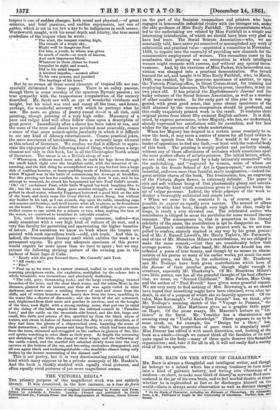THE VICTORIA REGIA.*
THE primary purpose of this magnificent work was not entirely literary. It was conceived, in the first instance, as a tour de force
• The Victoria Regia. A Volume of original Contributions in Poetry and Prone. Edited by Adelaide A. Procter. London : Printed and published by Emily Faithfull and Co., Victoria Press (for the Employment of Women), Great Comm- street.
on the part of the feminine compositors and printers who have engaged in honourable industrial rivalry with the stronger sex, under the able guidance of Miss Emily Faithfull. The circumstances which led to the undertaking are related by Miss Faithfull in a simple and interesting introduction, of which we should have been very glad to have had more. The Social Science Association—who, we are constantly told, have never yet conceived or accomplished any work of substantial and practical value—appointed a committee in November, 1859, to inquire into the necessity of providinn new channels for the remunerative employment of women. This committee came to the conclusion that printing was an occupation in which intelligent women might compete with success, and without any special incon. venience. And, by the exertions of Miss Parkes, this benevolent con- viction was changed into a practical demonstration. She herself learned the art, and taught it to Miss Emily Faithfull, who, in March, 1860, was enabled, by the generous assistance of another, to open the Victoria Printing-office, in Great Coram-street, for training and employing feminine labourers. The Victoria press, therefore, isnot yet two years old. It has printed the Englishwoman's Journal and the bulky volumes of the Social Science Association, as well as a number of other smaller works. In the early part of this year it was sug- gested, with great good sense, that some choice specimens of the skill attained by the women-compositors should be produced, and this really exquisitely printed work is the result. It contains short original pieces from about fifty eminent English authors. It is dedi- cated, by express permission, to her Majesty, who has, we understand, already expressed her satisfaction with its execution, and her best wishes for the success of the whole undertaking. When her Majesty has deigned in a certain sense concisely to re- view the book, it may seem a matter of course for all loyal critics to echo the speech from the throne. Nor would it be easy for a leader of opposition to find any fault,—at least with the material body of this book. The printing is simply perfect and perfectly simple, without any of those affectations of archaism which sometimes spoil the most perfect efforts of artistic printers. The initial letters, which, we are told, were " designed by a lady intimately connected" with the undertaking, and "engraved by women, some of whom are pupils in the female School of Art in Queen-square," are extremely beautiful, and even more than fanciful, really imaginative,—indeed the great artistic charm of the book. The frontispiece, too, an engraving of the Victoria .&gia flower, is extremely delicate. The paper is rich and soft without being of that pharisaically glessysand ostenta- tiously wealthy kind which sometimes gives to expensive books the air of vulgar parvenus. Indeed, the whole physique of the work in- dicates a thoroughly cultivated and simple taste. • When we come to the contents it is, of course, quite im- possible to expect an equally even success. The annual or album species, to which the book, though very high of its class, really be- longs, is rarely a very elevated one. The celebrated author who contributes is obliged to scour his portfolios for some unused literary remnant. The consequence is, that in proportion to the literary celebrity of the name, the contribution is apt to disappoint us. The Poet Laureate's contribution to the present work is, we are com- pelled to confess, scarcely marked in any way by his great genius; and of Mr. J. Russell Lowell'a, Mr. Henry Taylor's, Mr. Patmore's, and of one of Mr. Monckton Milnes's contributions, we are obliged to make the same remark,—that they are considerably below their average powers. On the other hand, Mr. Matthew Arnold has con- tributed a poem of true beauty, and though by no means so charac- teristic of his genius as many of his earlier works, yet much the most beautiful poem, we think, is the collection ; and Mr. Thackeray and Mr. Trollope have both given contributions which have all the flavour of their peculiar genius, though slight enough in structure, especially Mr. Thackeray's. Of Mr. Monckton Milnes's two little poems, one has all theful thought of his best efforts— that, we mean, on "Second Childhood." Miss Parkes, Miss Craig, and the author of " Paul Ferroll" have given some graceful stanzas. We are very sorry to find nothing of Mrs. Browning's, as we should have hoped that something might have been obtained, even after her death, in aid of a purpose of which she so heartily approved. Of the tales, Miss Kavanagh's "John's Five Pounds" has, we think, after Mr. Trollope's amusing sketch of the " Voyage to Panama," the highest interest. Miss Martineau gives us a graphic little paper on Hayti. Of the prose essays, Mr. Maurice's lecture on " Cn ticism" is the finest. Mr. Venables has a charateristic and amusing essay on "Useful Knowledge." There appears to us to be some trash, as, for example, the "Design for a Gem;" but, on the whole, the proportion of pure trash is singularly small. Miss Procter has edited it with mach discretion, and, looking at the book as a whole—though we cannot think all the faculties of its soul quite equal to the body—many of them quite deserve this+eantiful organization; and, take it for all in all, it will not easily find a worthy rival of its own species.






























 Previous page
Previous page